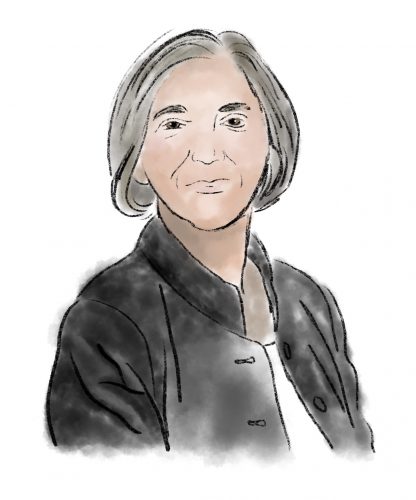Illustration courtesy of Ellie Gabriel.
From the very beginning, Barbara Ehrlich has been interested in using basic science to understand and address problems in human health.
As a professor of pharmacology at the Yale School of Medicine, she leads her research team in the search for new drugs that can help patients suffering from Wolfram syndrome, a pediatric genetic disorder characterized by childhood-onset diabetes, loss of vision and hearing, neurological and psychiatric symptoms, and often early death. Recently, Ehrlich and her team found that abnormal calcium signaling –– a method of communication between structures within cells –– may drive Wolfram syndrome pathogenesis. In light of this discovery, the group proposed a potential new treatment involving two existing drugs: ibudilast and a calpain inhibitor. Ehrlich’s is especially exciting because there are currently no treatments for this lethal disorder.
In addition to studying Wolfram syndrome, she is also studying polycystic kidney disease and
pain in the hands and feet during chemotherapy to look for pharmacological treatments.
Indeed, Ehrlich is driven by a desire to improve human health. She quotes her former mentor, “It’s called the National Institute of Health, and not the National Institute of Interesting Biological Phenomena.”
However, research is only part of Ehrlich’s position at Yale – she has also dedicated her life to mentoring students and supporting their budding careers in STEM. Ehrlich says that she learns a lot from her students about expectations and assumptions, and loves seeing them succeed in their future careers. “The most rewarding thing is when my former students tell me ‘You know, I was going to call you for some advice, but then I heard your voice in my head and I knew exactly what you were going to say,’” Ehrlich said.
In a way, Ehrlich is passing the torch of mentorship from when she received guidance as a young scientist. Throughout her life, Ehrlich says that she’s been blessed with many wonderful mentors, including Dr. Helen Cserr, who was involved in the Louise Lamphere vs Brown University sex discrimination lawsuit regarding tenured professors. “She was a tough woman,” Ehrlich says, “she had to fight for everything she got at the university.”
Throughout her career, Ehlrich has also experienced the impact of a working in a field long dominated by men. While still an undergraduate student, she got her first job working in at the Marine Biological Lab in Woods Hole, Massachusetts. “Back then, the only job available for girls was chamber maid. The boys were allowed to work in the lab, but they said those things weren’t for us. I couldn’t even get access to a lecture break,” Ehrlich said. But nevertheless, she persisted. And forged her own path. As a student, she combined her two thirty-minute breaks into an hour break so that she could attend lectures. After that summer, she went back to Brown and began to pursue science research under Helen’s guidance.
In graduate school at UCLA, she was the only female student to advance past the first year. Oftentimes, she was often sent to conferences and events where she was the only woman in the room. “There were times where I couldn’t get anyone to talk to me,” says Ehrlich.
And yet, Ehrlich says she was blessed by generous people at different points in her career. She recalls a specific moment during graduate school with a scientist who loudly exclaimed “This is so interesting!” while discussing her work to encourage his peers to accept her into what was very much a “boys with MD/PhDs club” at the time. Of the incidence, Ehrlich says “That was a long time ago, but it’s still a special moment for me.”
According to Ehrlich, those people are still needed. When she joined Yale 23 years ago, she was part of a special program to get tenured women at the School of Medicine. At that time, only 16-17 percent of tenured professors were women. Now, that number has jumped to 20 percent – a definite improvement, but not enough according to Ehrlich: “It’s the right direction, but we are not as far as I would like. I want to see some real change going forward.”
But she’s not just waiting for this change to happen. Ehrlich continues to advocate for her female students and encourage them to persist in the face of adversity. Confidence, a positive attitude, and being able to bounce back from failure are key for success in this field – something that she instills in all of her students, especially those who are women.
“They always find a way to my door,” Ehrlich says of her female students. “And I hope it stays like that as long as I’m here.”

